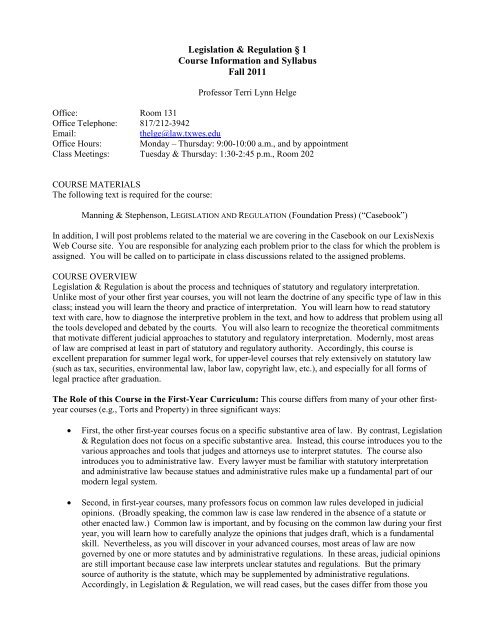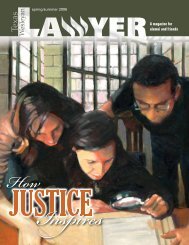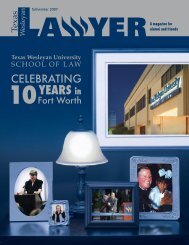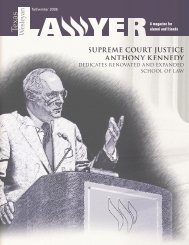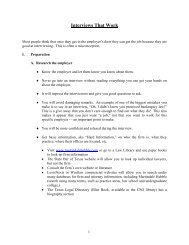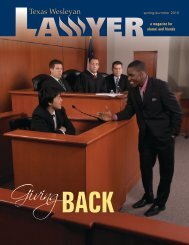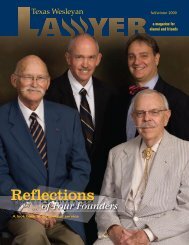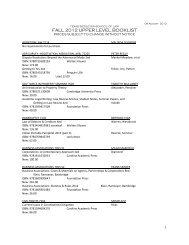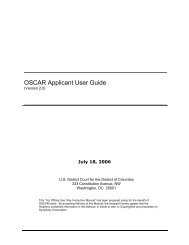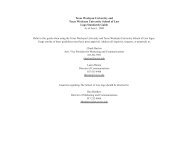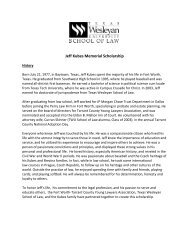Course Information and Syllabus - Texas Wesleyan School of Law
Course Information and Syllabus - Texas Wesleyan School of Law
Course Information and Syllabus - Texas Wesleyan School of Law
Create successful ePaper yourself
Turn your PDF publications into a flip-book with our unique Google optimized e-Paper software.
Legislation & Regulation § 1<br />
<strong>Course</strong> <strong>Information</strong> <strong>and</strong> <strong>Syllabus</strong><br />
Fall 2011<br />
Pr<strong>of</strong>essor Terri Lynn Helge<br />
Office: Room 131<br />
Office Telephone: 817/212-3942<br />
Email: thelge@law.txwes.edu<br />
Office Hours: Monday – Thursday: 9:00-10:00 a.m., <strong>and</strong> by appointment<br />
Class Meetings: Tuesday & Thursday: 1:30-2:45 p.m., Room 202<br />
COURSE MATERIALS<br />
The following text is required for the course:<br />
Manning & Stephenson, LEGISLATION AND REGULATION (Foundation Press) (“Casebook”)<br />
In addition, I will post problems related to the material we are covering in the Casebook on our LexisNexis<br />
Web <strong>Course</strong> site. You are responsible for analyzing each problem prior to the class for which the problem is<br />
assigned. You will be called on to participate in class discussions related to the assigned problems.<br />
COURSE OVERVIEW<br />
Legislation & Regulation is about the process <strong>and</strong> techniques <strong>of</strong> statutory <strong>and</strong> regulatory interpretation.<br />
Unlike most <strong>of</strong> your other first year courses, you will not learn the doctrine <strong>of</strong> any specific type <strong>of</strong> law in this<br />
class; instead you will learn the theory <strong>and</strong> practice <strong>of</strong> interpretation. You will learn how to read statutory<br />
text with care, how to diagnose the interpretive problem in the text, <strong>and</strong> how to address that problem using all<br />
the tools developed <strong>and</strong> debated by the courts. You will also learn to recognize the theoretical commitments<br />
that motivate different judicial approaches to statutory <strong>and</strong> regulatory interpretation. Modernly, most areas<br />
<strong>of</strong> law are comprised at least in part <strong>of</strong> statutory <strong>and</strong> regulatory authority. Accordingly, this course is<br />
excellent preparation for summer legal work, for upper-level courses that rely extensively on statutory law<br />
(such as tax, securities, environmental law, labor law, copyright law, etc.), <strong>and</strong> especially for all forms <strong>of</strong><br />
legal practice after graduation.<br />
The Role <strong>of</strong> this <strong>Course</strong> in the First-Year Curriculum: This course differs from many <strong>of</strong> your other firstyear<br />
courses (e.g., Torts <strong>and</strong> Property) in three significant ways:<br />
• First, the other first-year courses focus on a specific substantive area <strong>of</strong> law. By contrast, Legislation<br />
& Regulation does not focus on a specific substantive area. Instead, this course introduces you to the<br />
various approaches <strong>and</strong> tools that judges <strong>and</strong> attorneys use to interpret statutes. The course also<br />
introduces you to administrative law. Every lawyer must be familiar with statutory interpretation<br />
<strong>and</strong> administrative law because statues <strong>and</strong> administrative rules make up a fundamental part <strong>of</strong> our<br />
modern legal system.<br />
• Second, in first-year courses, many pr<strong>of</strong>essors focus on common law rules developed in judicial<br />
opinions. (Broadly speaking, the common law is case law rendered in the absence <strong>of</strong> a statute or<br />
other enacted law.) Common law is important, <strong>and</strong> by focusing on the common law during your first<br />
year, you will learn how to carefully analyze the opinions that judges draft, which is a fundamental<br />
skill. Nevertheless, as you will discover in your advanced courses, most areas <strong>of</strong> law are now<br />
governed by one or more statutes <strong>and</strong> by administrative regulations. In these areas, judicial opinions<br />
are still important because case law interprets unclear statutes <strong>and</strong> regulations. But the primary<br />
source <strong>of</strong> authority is the statute, which may be supplemented by administrative regulations.<br />
Accordingly, in Legislation & Regulation, we will read cases, but the cases differ from those you
ead in your other first-year courses in that they generally involve a court interpreting a statute or<br />
regulation rather than adding to the common law.<br />
• Third, in your other courses, you will <strong>of</strong>ten read cases in which courts develop common-law rules.<br />
This may lead you to believe that the goal <strong>of</strong> reading cases is to identify the black-letter law. But in<br />
Legislation & Regulation, you will learn fewer rules. Judges frequently disagree with respect to the<br />
approaches <strong>and</strong> tools that courts should use in interpreting a statute. In this course, you will find that<br />
<strong>of</strong>ten, there are no hard-<strong>and</strong>-fast rules, <strong>and</strong> there is not one right answer. In reading the cases, rather<br />
than identifying the black-letter law, you will need to focus on the approach <strong>and</strong> the tools that the<br />
court uses in interpreting the statute. By underst<strong>and</strong>ing the various approaches to <strong>and</strong> tools used in<br />
statutory interpretation you will learn to argue effectively on your client’s behalf, no matter which<br />
competing interpretation <strong>of</strong> the statute favors your client’s position.<br />
Briefing the Cases: Because this course differs from your other courses, you should take a slightly different<br />
approach to briefing cases. Most <strong>of</strong> the cases that we read will involve a situation in which it is not clear<br />
how some specific statutory language should be interpreted in applying the relevant statute to the facts <strong>of</strong> the<br />
case. The issue is usually what approach does the court follow <strong>and</strong> what tools does it use in interpreting the<br />
statute <strong>and</strong> resolving the case. The cases that we will read involve statutes from various substantive areas,<br />
e.g., criminal law, environmental law <strong>and</strong> employment law. But you do not need to focus on the specific<br />
substantive rule that is at issue in the case. Your goal is not to learn criminal law, environmental law or<br />
employment law for this course. Instead, you should take the following approach in briefing the cases:<br />
• First, identify the specific statutory language at issue. If I call on you in class, you should be able to<br />
tell me specifically what language in the statute the court is concerned with.<br />
• Second, identify the possible ways in which the statute could be interpreted. Usually, one party will<br />
argue for one interpretation <strong>and</strong> the other party will argue for another. You should know which party<br />
supports a given interpretation <strong>and</strong> the argument that party makes in support <strong>of</strong> it.<br />
• Third, identify the interpretation that the court determines is appropriate <strong>and</strong> which party wins as a<br />
result.<br />
• Fourth, consider why the court settled on the interpretation it chose. What approach to statutory<br />
interpretation did the court use, i.e., intentionalist, purposivist, or textualist? What tools <strong>of</strong> statutory<br />
construction did the court use, e.g., canons <strong>of</strong> construction or legislative history?<br />
• Fifth, consider whether you agree or disagree with the court <strong>and</strong> why.<br />
COURSE REQUIREMENTS<br />
LexisNexis Web <strong>Course</strong>: We have a course web site on LexisNexis Web <strong>Course</strong>, available at<br />
www.lexisnexis.com/lawschool. You are required to register for the site <strong>and</strong> check it regularly. During the<br />
course <strong>of</strong> the semester, I will post course materials on our LexisNexis Web <strong>Course</strong> site, so it is important that<br />
you register as soon as possible. Periodically, I will send emails to the class through LexisNexis Web<br />
<strong>Course</strong>. Therefore when you register, use an email address that you will check frequently. I encourage<br />
students to use our LexisNexis Web <strong>Course</strong> site to complement our readings <strong>and</strong> in-class discussions. Feel<br />
free to post links to news stories or articles or your own comments or discussions relevant to the material we<br />
are covering this session. If you have questions about LexisNexis Web <strong>Course</strong>, you should contact the law<br />
school’s LexisNexis representative.<br />
Class Preparation: Class preparation is required. If you do not regularly prepare for class meetings, you<br />
will have difficulty mastering the material. Adequate preparation includes a careful briefing <strong>and</strong> analysis <strong>of</strong><br />
the cases, problems <strong>and</strong> other assigned materials.<br />
Page 2
Attendance: Regular attendance is critical to putting the pieces together over the semester. The law school<br />
attendance policy will be enforced. You are deemed absent if you are not in the classroom when class is<br />
scheduled to begin or if you leave the classroom before class is dismissed. You are responsible for signing<br />
the attendance roster during class <strong>and</strong> for keeping track <strong>of</strong> your absences. The seat you select on the 1 st day<br />
<strong>of</strong> class will be your assigned seat for the semester. It is your responsibility to ensure that your name appears<br />
on the seating chart in the correct place <strong>and</strong> that you sit in the appropriate seat. Please refer to the law<br />
school’s Academic St<strong>and</strong>ards for pertinent information regarding the law school’s attendance policy.<br />
Participation: Participation in class dialogues <strong>and</strong> discussion is required. You should expect to be called on<br />
at r<strong>and</strong>om during class. If for some reason you are not prepared on a given day, please let me know before<br />
class starts, <strong>and</strong> I will not call on you that day. You are allowed only one such “pass” for the entire semester.<br />
Your final grade may be adjusted to reflect the quality <strong>of</strong> your participation <strong>and</strong> your preparation, when<br />
called upon, to present a case or problem in class. I may reward a student whose class participation over the<br />
course <strong>of</strong> the semester I find to be particularly valuable by adding one grade increment to that student’s final<br />
grade. Note that it is the content <strong>and</strong> quality <strong>of</strong> your participation that is the basis for the award, not the<br />
quantity. Failure to be prepared when called upon or disruptive classroom behavior may result in a penalty<br />
such as dismissal <strong>of</strong> the student from the class meeting <strong>and</strong>/or a deduction <strong>of</strong> one grade increment from the<br />
student’s final grade for each such occurrence.<br />
FINAL EXAMINATION<br />
Your grade in this course will be based primarily on your performance on the final exam. The final exam<br />
will consist <strong>of</strong> a combination <strong>of</strong> multiple choice questions, short answer questions, <strong>and</strong> essay questions. I<br />
will provide you with more details about the exam later in the semester. Because the exam questions are<br />
confidential, you must return the question booklet with your exam number on it to receive credit for the<br />
exam.<br />
For multiple choice questions, read the questions very carefully. Each question st<strong>and</strong>s on its own facts unless<br />
otherwise indicated. Do not assume or make up additional facts. I have tried to create one “best” response<br />
for each. If two or more answers are true for any question, choose the more complete <strong>and</strong> specific answer. If<br />
you feel there is no best answer or that the question is in some other way defective, you may jot down the<br />
question number <strong>and</strong> your challenge to the question on your exam. If you convince me that the problem is<br />
defective, I will eliminate that question from the exam for all students.<br />
USE OF ELECTRONIC DEVICES/RECORDING<br />
As a courtesy to your classmates <strong>and</strong> me, please make sure your cell phone, pager or similar electronic<br />
device is turned <strong>of</strong>f at the beginning <strong>of</strong> class. If you are expecting an emergency call, please use the vibrate<br />
or text message feature on your cell phone <strong>and</strong> leave class before answering any call. In addition, please be<br />
certain that your computer is silent. During class meetings, your use <strong>of</strong> any electronic devices must be solely<br />
for purposes directly related to the class. Your use <strong>of</strong> electronic devices for any other purpose is prohibited.<br />
Examples <strong>of</strong> prohibited uses <strong>of</strong> electronic devices include surfing the internet, updating your Facebook page,<br />
playing games <strong>of</strong> any kind, <strong>and</strong> reading or sending electronic messages. Subject to the <strong>Law</strong> <strong>School</strong><br />
Disability Policy, you may not record (audio or visual) any class without my prior permission.<br />
LAW SCHOOL DISABILITY POLICY<br />
<strong>Texas</strong> <strong>Wesleyan</strong> <strong>School</strong> <strong>of</strong> <strong>Law</strong> adheres to a disability policy that is in keeping with relevant federal law. The<br />
law school will provide appropriate accommodation as determined by the Assistant Dean <strong>of</strong> Student Affairs<br />
in consultation with the Director <strong>of</strong> the Counseling Center. Students must notify the Assistant Dean <strong>of</strong><br />
Student Affairs <strong>of</strong> any permanent or temporary disabilities <strong>and</strong> must provide documentation regarding those<br />
disabilities prior to the granting <strong>of</strong> an accommodation. Due to the law school’s policy <strong>of</strong> testing anonymity,<br />
students should not discuss their disabilities with pr<strong>of</strong>essors. For assistance, students should consult with the<br />
Assistant Dean <strong>of</strong> Student Affairs.<br />
Page 3
READING ASSIGNMENTS<br />
We will read <strong>and</strong> discuss the reading assignments for the course in the order indicated below. Please note<br />
that the numbered reading assignments listed below do not correspond to individual class meetings. For any<br />
given class meeting, you may be responsible for more than one <strong>of</strong> the numbered reading assignments. At the<br />
end <strong>of</strong> each class, I will let you know which reading assignments we will cover in the next class meeting.<br />
Assignment for the First Class: Please read <strong>and</strong> be prepared to discuss reading assignments 1 <strong>and</strong> 2.<br />
Note: I reserve the right to vary this syllabus at any time as I deem necessary.<br />
Introduction to Legislation <strong>and</strong> Statutory Interpretation<br />
1 Foundational Theories <strong>of</strong> Statutory Interpretation pp. 2-3; 19-22; 201-215<br />
2 The Legislative Process pp. 22-28<br />
The Letter <strong>of</strong> the <strong>Law</strong> vs. the Spirit <strong>of</strong> the <strong>Law</strong><br />
3 The Classic Approach pp. 28-49<br />
4 The New Textualism pp. 49-67<br />
5 Judicial Correction <strong>of</strong> Legislative Mistakes:<br />
Absurdity <strong>and</strong> Scrivener’s Error<br />
Page 4<br />
pp. 85-111<br />
Statutory Interpretation: Determining the Meaning <strong>of</strong> the Text<br />
6 Specialized or Ordinary Meaning? pp. 111-115<br />
7 Colloquial Meaning or Dictionary Meaning? pp. 126-140<br />
Statutory Interpretation: Legislative Sources<br />
8 Sources <strong>of</strong> Legislative History pp. 140-142; 152-160<br />
9 Legislative Acquiesce pp. 160-162<br />
10 Uses <strong>of</strong> Legislative History pp. 163-201<br />
11 Conflicting Statutes & Implied Repeal H<strong>and</strong>out<br />
Statutory Interpretation: The Textual Cannons<br />
12 Introduction to Cannons <strong>of</strong> Construction pp. 219-224<br />
13 Noscitur a Sociis, In Pari Materia, the Identical<br />
Words Presumption <strong>and</strong> the Rule Against Surplusage<br />
pp. 233-249<br />
14 Expression (or Inclusio) Unius Est Exclusio Alterius pp. 224-233<br />
15 Ejusdem Generis pp. 249-266<br />
Statutory Interpretation: Substantive Cannons <strong>of</strong> Construction<br />
16 The Constitutional Avoidance Doctrine pp. 266-288<br />
17 The Clear Statement Rule pp. 288-306<br />
18 The Rule <strong>of</strong> Lenity pp. 327-337<br />
Introduction to Regulatory <strong>Law</strong><br />
19 The Role <strong>of</strong> Administrative <strong>Law</strong> <strong>and</strong> Overview <strong>of</strong> the pp. 358-379; 580-603<br />
Regulatory Process<br />
20 Notice <strong>and</strong> Comment Rulemaking pp. 604-641; 739-756<br />
21 Rulemaking vs. Adjudication pp. 641-674<br />
22 Agency Guidance Documents <strong>and</strong> Interpretive Rules pp. 674-697; 706-717<br />
23 Judicial Review <strong>of</strong> Agency Rules pp. 717-739; 756-781<br />
24 Judicial Review <strong>of</strong> Agency Interpretations pp. 792-835<br />
25 Deference <strong>and</strong> Textual Interpretation pp. 835-867<br />
26 Limits on Chevron’s Domain pp. 916-940


